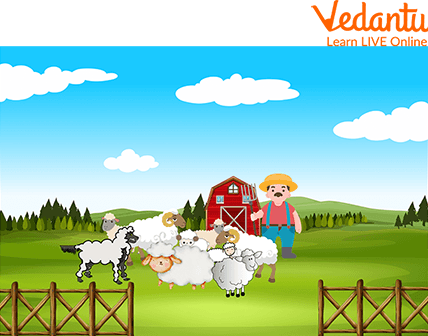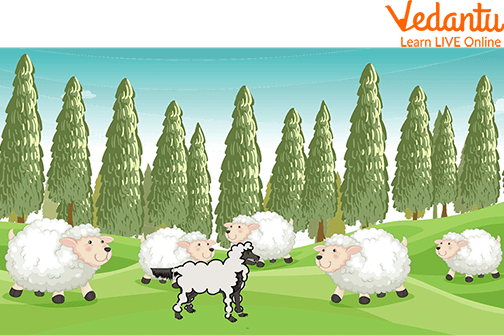Wolf in Sheep’s Clothing Story

An Overview of the Story
The idiom and fable "The Wolf in Sheep's Clothing" are well-known. Most people would attribute the fable to Aesop, the greatest fabulist of all time. This, however, is incorrect, as we will discuss later in our summary of the story. Every story contains a life lesson that we should all learn. This story, like others, has morals, so let us investigate and discover the moral of this interesting short story. Have you ever encountered a wolf? No? So let us now read about a Wolf in Sheep's Clothing. The characters in this story of the wolf are the Shepard, the Sheep and Wolf.
Wolf in a Sheep’s Skin
Once upon a time, there was a wolf. The wolf lived near the farm. Day after day, the wolf watched the farm. He wished to eat the sheep on the farm. The sheep were just slight stupid. The sheep would obey anyone. They followed the farmer. They obeyed the farmer’s son. They obeyed the farmer’s dog. When the sheep were lonely, they just followed other sheep.

Sheep and Wolf with Farmer
The wolf saw from a distance and said, “Ha ha, foolish sheep. You follow anyone.”
The wolf went to the farm. He liked getting the delicious sheep to follow him from the farm. “Follow me, little innocent sheep,” he said. But the sheep were not that idiot. They were commonly afraid of the wolf. The sheep cried “Ba Ba Ba”. The farmer was not at a very long distance away. He ran to save the sheep. The wolf ran away.

Sheep Following the Wolf
The next day, the wolf had an indication! The sheep would not obey a wolf, but they would follow an innocent sheep. So the wolf left for the farm. Slowly, he attacked one sheep, and he ran away with it. He ate the sheep’s fresh meat but conserved the sheep’s skin. The wolf used its skin as a mask. The wolf put on the sheep’s skin. Now he glanced like a sheep.
The next day, the wolf got onto the farm. “Follow me, little sheep,” he said. During this period, the sheep were not worried. He did not look like a wolf. The sheep obeyed the wolf silently. They were not afraid as they vacated the farm.
The sheep obeyed the wolf. They were a long time from the farm. The farmer could not hear them. He could not conserve the sheep.

The Wolf in the Sheep's Clothes
Suddenly, the wolf said, “Ha ha, foolish sheep. You follow anyone. I will eat you all!”
“Ba ha!” moaned the sheep sadly. But the farm was a long time away. The sheep were very afraid of the horrible wolf.
Just by opportunity, that day was the day of a special party. The farmer went to murder one sheep to eat at the party.
So the farmer glanced for the sheep. When he arrived, the farmer looked over the sheep. He looked for the giant, fattest sheep. The biggest sheep was the act wolf. At just the right moment, the farmer put up his axe silently. Whoosh! The axe went down and killed the wolf.
The wolf’s “Ha ha” quit suddenly. The sheep were safe.
The Wolf in Sheep’s Clothing Moral
In this story, the sheep were easily fooled by the wolf. The sheep were naive enough to trust the wolf when the wolf’s body was covered with the sheep’s skin. The children can learn a lot of valuable lessons here. The story teaches children to not trust any strangers blindly. They must always trust only their parents and other relatives and not any random stranger.
Summary
This interesting and short story has taught us not to be naive. In this story of the Wolf and Sheep, the wolf tries various ways to hunt sheep for food. Firstly the wolf knew that the sheep were naive, so the wolf just went into the yard and asked to follow him. But the sheep were not naive enough to follow the wolf. The wolf later dressed as a sheep by wearing a dead sheep’s skin and then asked to follow him and the sheep followed. The sheep and wolf were walking. After knowing the wolf’s true self, all the sheep were scared. But the Shepard luckily saved his sheep and killed the wolf. We hope you enjoyed this fascinating tale. In case of any other doubts feel free to ask in the comments.


FAQs on Wolf in Sheep’s Clothing Story
1. What is a fable?
A story that teaches a lesson or has a moral to learn is essential for life.
2. What is the major difference between a wolf and a sheep?
Wolves are cunning animals and are considered to be aggressive by nature whilst sheep are productive and passive by nature.
3. What is meant by the fables of the prophets?
The author Khushwant Singh refers to the tales his grandmother used to tell him or his cousins when they were young when he uses the phrase "fables of the prophets."




